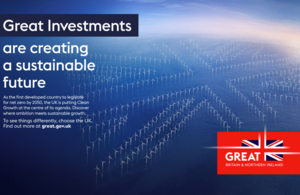5th UK-Taiwan Energy Dialogue
The UK hosted the 5th UK-Taiwan Energy Dialogue in London on 13 June 2023. The Dialogue is the centrepiece of bilateral cooperation on energy and climate issues

The Dialogue was opened by the Prime Minister’s Trade Envoy Lord Faulkner and Taiwan’s Representative to the UK Kelly Hsieh, and co-chaired by Julie Scott, Head of Energy Diplomacy of Department for Energy Security and Net Zero, and YU Cheng-Wei, Director General at the Bureau of Energy, Ministry of Economic Affairs.
The Dialogue focused on long-term challenges and opportunities, opening with keynotes on energy security and a just transition (greening the economy in a way that is fair and inclusive), and included deep-dives into marine spatial planning and low-carbon hydrogen.
Dr Ameena Camps, a Commissioner at Scotland’s Just Transition Commission, delivered a keynote address, explaining that for the Scottish government, a just transition is about outcomes – a fairer, greener future for all – as well as an inclusive process that centres participatory approaches to designing solutions. Ameena explained the role of the independent Just Transition Commission, key messages from the Commission’s first report, and provided examples of current just transition challenges and opportunities. She highlighted different options for structuring the ownership of energy, giving the example of community-owned wind farms supporting energy transition while multiplying benefits to the community.
Scotland took world-leading action to embed the principle of a just transition in climate legislation and has become a key reference point for Taiwan in this area. A week after the Dialogue a delegation from Taiwan’s National Science and Technology Council visited Glasgow Caledonian University’s Centre for Climate Justice, the Scottish Government and the Just Transition Commission to engage in further policy exchanges and discuss research collaboration.
The next session focused on marine spatial planning. Presenters from the Crown Estate, Department for Environment, Food & Rural Affairs (Defra) and Centre for Environment, Fisheries and Aquaculture Science (Cefas) detailed how the UK’s marine plans seek to maximise coexistence between different sea users, and the ways in which data and evidence are used to analyse issues such as spatial interactions between different users and the evolution of ecosystems. British Office Taipei outlined the key recommendations from two reports commissioned in the last year on long term planning for Taiwan’s ports and skills development, to accommodate the expansion of offshore wind in Taiwan. The reports highlighted that investment in port infrastructure is essential for Taiwan to hit its offshore wind targets and shared UK’s experience in enhancing skills and talent on offshore wind industry.
The final session covered low-carbon hydrogen. The Department of Energy Security and Net Zero introduced the UK’s low carbon hydrogen standard, which establishes a threshold for greenhouse gas emissions and a methodology for calculating emissions, the £240m net zero hydrogen fund, which funds the development and deployment of new low carbon hydrogen production, and the hydrogen production business model, which will provide hydrogen producers 15 years of revenue support. Taiwan Power Company presented experiments in co-firing using hydrogen, and described an adaptive policy approach that involves monitoring developments and making rolling adjustments.
During their visit to the UK, the Taiwanese delegation also visited the Joint Rescue Coordination Centre near Southampton to learn more about the UK’s approach to emergency response on offshore wind farms and met innovative British firms exhibiting in the UK Offshore Renewable Energy Catapult stand at the Global Offshore Wind expo.
UK Trade Envoy to Taiwan, Lord Faulkner of Worcester:
The UK is a world leader in offshore wind, and the UK and Taiwan have a history of cooperation on offshore wind, energy policy, industrial development and R&D over the past 20 years. I am sure this year’s Energy Dialogue will continue to deepen our partnership towards a net zero future. I am looking forward to visiting Taiwan in September to attend the 18th UK-Taiwan Renewable Energy Conference and lead a trade mission to introduce UK firms to the Taiwanese market.
Kelly Hsieh, Taiwan’s Representative to the UK:
The UK has long been a global leader in offshore wind power and innovative research in renewable energy and decarbonisation. It has become a destination for countries seeking professional knowledge and advice, and a role model for Taiwan to learn from.
Julie Scott, Head of Energy Diplomacy, International Energy Unit, Department for Energy Security & Net Zero:
The clean energy transition is an opportunity for the world to diversify energy systems to support energy security, energy access and affordability, as well as delivering on Net Zero commitments. The clean energy transition affects all parts of society, and it is important that transitions are just and inclusive.
YU Cheng-wei, Director General of Bureau of Energy:
Currently, Taiwan is in the process of planning a floating wind demonstration project; our delegation has visited UK government officials working on floating wind. As for hydrogen, Taiwan has organized a ‘Hydrogen Energy Promotion Taskforce’ to promote hydrogen development strategies for the short, medium, and long term.